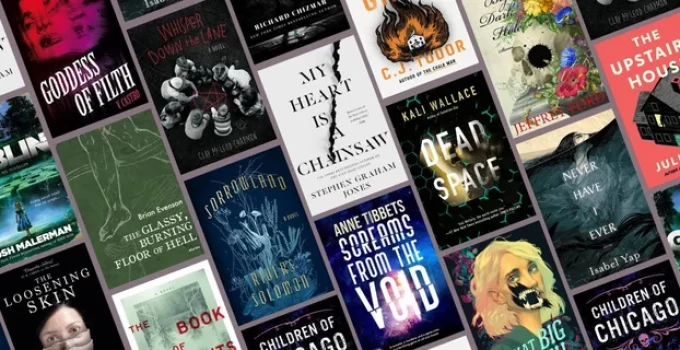Introduction
Fiction books have captivated readers for centuries, taking them on thrilling journeys to imaginary worlds. Among the various genres, horror books hold a special place, offering a unique blend of suspense, fear, and psychological intrigue. In this article, we’ll delve into the fascinating realm of fiction books, focusing on the horror genre. Whether you’re an avid reader or curious about exploring new literary landscapes, join us as we uncover the appeal of horror books and highlight some noteworthy titles.
The Appeal of Fiction Books
Fiction Books have an inherent allure that transports readers to different realms of imagination. These captivating stories allow us to escape the confines of reality, diving into narratives brimming with adventure, romance, mystery, or even horror. The beauty of fiction lies in its ability to evoke emotions, provoke thoughts, and ignite our imagination.
Exploring the Horror Genre
The horror genre, in particular, elicits a wide range of emotions, from spine-chilling fear to exhilarating suspense. Horror books delve into the darker corners of the human psyche, confronting readers with supernatural entities, psychological terrors, and the macabre. They play with our fears, forcing us to confront the unknown and explore the boundaries of our own courage.
Top Horror Fiction Books
- “It” by Stephen King: Stephen King’s magnum opus takes readers on a chilling journey into the town of Derry, where a malevolent clown preys on the fears of its inhabitants.
- “The Haunting of Hill House” by Shirley Jackson: This classic haunted house tale follows four individuals who spend a summer in a mansion with a sinister past, leading to terrifying consequences.
- “Dracula” by Bram Stoker: The iconic vampire novel introduces Count Dracula, a timeless embodiment of evil, and follows his quest for blood across Transylvania and Victorian England.
- “The Shining” by Stephen King: This psychological horror masterpiece tells the story of the Torrance family, who become caretakers of the isolated Overlook Hotel, where supernatural forces unravel their sanity.
- “Frankenstein” by Mary Shelley: A foundational work of gothic horror, “Frankenstein” explores themes of creation, responsibility, and the consequences of playing god.
Tips for Choosing the Right Horror Book
When selecting a horror book, it’s essential to consider personal preferences and comfort levels. Here are some tips to guide you in choosing the right book:
- Determine your preferred horror subgenre, such as supernatural horror, psychological horror, or creature horror.
- Research the author’s reputation within the horror genre to ensure a captivating and well-crafted story.
- Read reviews or summaries to gauge the level of gore, violence, or explicit content, as different readers have varying tolerance levels.
- Experiment with different authors and subgenres to discover what resonates with you the most.
Benefits of Reading Horror Books
Contrary to popular belief, reading horror books can offer numerous benefits beyond the adrenaline rush. Here are some advantages of indulging in the horror genre:
- Building empathy: Horror books often portray complex characters and explore the depths of their emotions, allowing readers to empathize with their struggles and fears.
- Enhancing resilience: Experiencing fear in a controlled environment, such as through horror books, can help individuals develop resilience and cope with real-life challenges.
- Sharpening cognitive skills: The twists and turns in horror narratives keep readers engaged, enhancing critical thinking, problem-solving, and analytical skills.
Overcoming the Fear Factor
It’s natural to feel apprehensive when diving into the horror genre. To manage fear and discomfort while reading, consider the following tips:
- Start with milder horror books and gradually progress to more intense ones.
- Establish reading boundaries and take breaks if the content becomes overwhelming.
- Engage in discussions with fellow readers to share experiences and lessen any unease.
- Remember that fear is a temporary emotion and can be controlled by closing the book or taking a breather.
Horror Books for Different Age Groups
Horror Books cater to readers of all ages, with appropriate content and themes tailored to specific age groups. Here are some recommendations:
- Children (8-12 years): “Goosebumps” series by R.L. Stine, providing spooky adventures suitable for young readers.
- Young adults (13-18 years): “Coraline” by Neil Gaiman, a dark fantasy tale that explores bravery and the importance of family.
- Adults: “The Silence of the Lambs” by Thomas Harris, a gripping psychological thriller that delves into the mind of a notorious serial killer.
Reading Fiction Books for Mental Well-being
Reading fiction, including horror books, offers a host of benefits for mental well-being:
- Escape from reality: Fiction allows us to temporarily detach from daily stressors, offering a much-needed mental escape.
- Emotional catharsis: Horror books can help readers process and release negative emotions in a controlled and safe environment.
- Empathy and self-reflection: Fiction books, including horror stories, foster empathy and encourage introspection by immersing us in diverse characters’ experiences.
Conclusion
Fiction books, particularly within the horror genre, provide an immersive and captivating reading experience. They transport readers to thrilling worlds, challenge their fears, and offer a unique form of entertainment. By exploring the depths of human emotions and confronting our deepest fears, horror books enrich our lives and broaden our perspectives. So, take a leap into the realm of fiction and discover the spine-tingling allure of horror.



